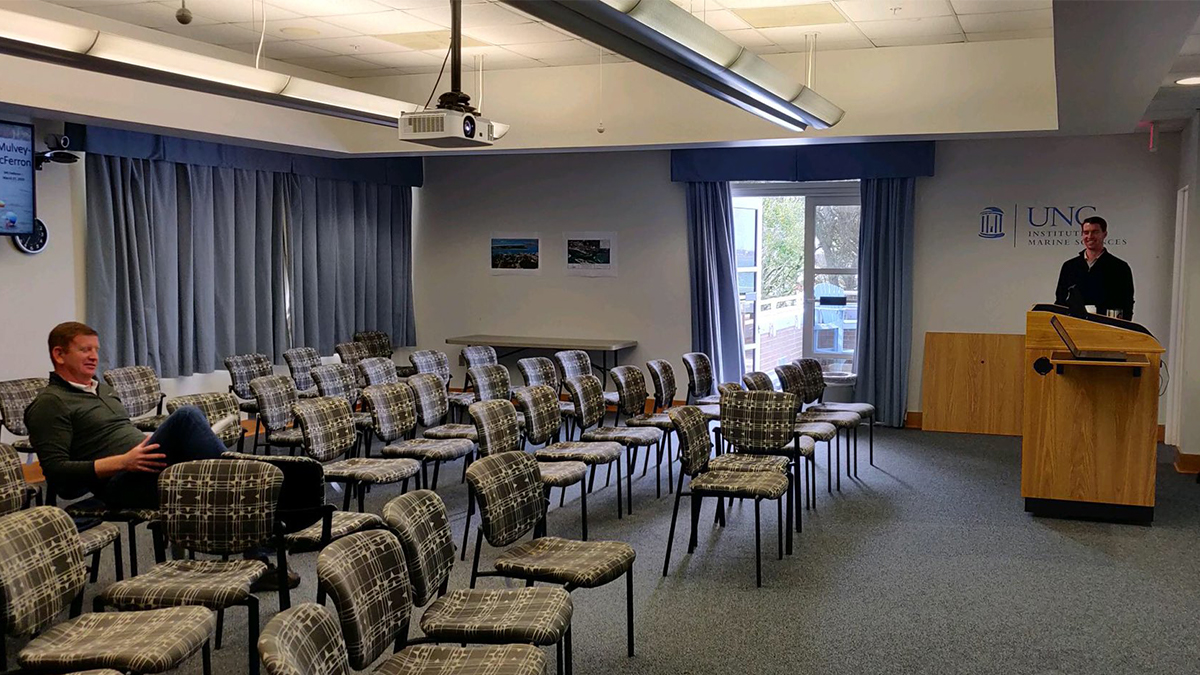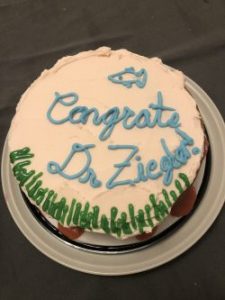Because of social distancing precautions, graduate students are using online platforms like Zoom to fulfill a cherished rite — defending their dissertations and theses.

The dissertation defense — an academic tradition with roots in the Middle Ages — has undergone a radical change in the COVID-19 era. Welcome to #VirtualDefense.
This spring’s COVID-19 outbreak coincided with dissertation-defense season, causing graduate students to scramble in mid-March to prepare to make presentations online instead of in person. A new hashtag — #VirtualDefense or sometimes #COVIDeoDefense — sprang up on Twitter as students and faculty adapt to new social distancing guidelines.
Students are finding that their presentations themselves aren’t so different, but the virtual experience lacks the celebratory spirit right for such a milestone moment.
“It was a bummer not to have my family there because I was looking forward to explaining to them what I’ve been doing for the last three years of my life,” said Owen Mulvey-McFerron, who defended his master’s thesis, “Effects of landscape-scale oyster-reef restoration on nekton communities in a temperate estuary.”
“They were able to connect virtually, but it’s still a little bit different from having everyone there in the room,” he said.
#VirtualDefense Tips
Avoid slides with animations. Streaming interferes with their timing.
Mark or highlight items you would normally point to.
Have someone else handle the streaming. They can mute or unmute people, ask questions sent through chat and get rid of unwelcome guests.
Make sure your background looks professional.
Practice talking to your computer.
Plug in your laptop.
Be flexible. Be very flexible.
Doctoral students especially had looked forward to committee members congratulating and calling them “doctor” for the first time.

Angelica Leigh waited for her committee’s answer on March 17 after defending her dissertation in organizational behavior, a day she’d been working toward for five years. “When my adviser said to me, ‘Congratulations, Dr. Leigh,’ everyone else was pretty silent for at least 10 seconds. Which sounds like a short time, but in this high-pressure environment it felt like an eternity,” Leigh said.
Leigh tweeted a photo of herself smiling and holding up a sign that read, “Hello, my name is Dr. Leigh.” But it just wasn’t the same.
Faculty members felt the social distancing, too.
“You give up that wonderful communal feeling when it’s done by a video screen,” said Michael Piehler, marine sciences professor and director of the Institute for the Environment, who participated in 11 virtual defenses in two weeks. “It’s a strange time. But people are making the most of it.”
The defense tradition
The dissertation or thesis defense dates to the Middle Ages, when academic lectures ended with a discussion called a “disputatio.”
In modern American universities, the tradition survives as the defense of a master’s thesis or doctoral dissertation, usually made up of two parts: a public presentation and a private oral exam by a faculty committee about the topic of the paper. The odds of failing a defense are extremely low, but for most scholars the event is a rite of passage, anticipated with anxiety and celebrated with relief.
Online defenses have long been an option at Carolina, but they became mandatory when the COVID-19 pandemic forced a campus shutdown.
Rachael Flatt defended her master’s thesis in clinical psychology on March 24, from the guest room that is now her office. She wasn’t too concerned about doing her defense online. “My Ph.D. adviser, Dr. Cynthia Bulik, is often in Sweden as she has a dual appointment at UNC and at the Karolinksa Institute in Stockholm, so I have used Zoom quite a bit,” she said.
As a department, marine sciences is more familiar than most with remote operations. Many faculty members and students are in Chapel Hill, but roughly half of them are based in Morehead City at the Institute of Marine Sciences, so remote meetings and classes are common.
The presentations often stream from an IMS seminar room filled with students, faculty and researchers from other coastal university or government marine labs. The difference this time was that the room was empty except for the student’s adviser.
But if the in-person audience was scant, the online audience more than made up for it. To cheer on the graduate students, IMS communicator Kerry Irish tweeted promotions for each defense – with limericks. Mulvey-McFerron’s went like this:
There once was a boy who loved fish.
To study was his greatest wish.
In sounds he did play
With nekton all day.
His defense you don’t want to miss.

Because of these tweets — and with so many colleagues and friends stuck at home — marine sciences students found themselves presenting to many more than the usual handful of family and friends.
Shelby Ziegler, an environment, ecology and energy doctoral candidate, was happy that her family, far-flung friends and future employers could see her presentation, she said. “But I never expected for 100 people to be watching my defense. That’s a little crazy.”
Most of the defenses went smoothly, but there were a few technical glitches. When Mulvey-McFerron turned away from the computer, his audience couldn’t hear him. Leigh’s laptop died because she forgot to plug it in. And one marine sciences student got “Zoombombed” during his presentation.
“Someone made a few random comments in the chat function,” Irish said. But the presenter, a former high school teacher, was “able to roll with it masterfully.”
These #VirtualDefense guinea pigs have a few tips for others who will follow them (see above) and for faculty committee members.
“In a virtual environment,” Leigh said, “make sure you really show your enthusiasm and express your congrats with energy.”
By Susan Hudson, The Well
